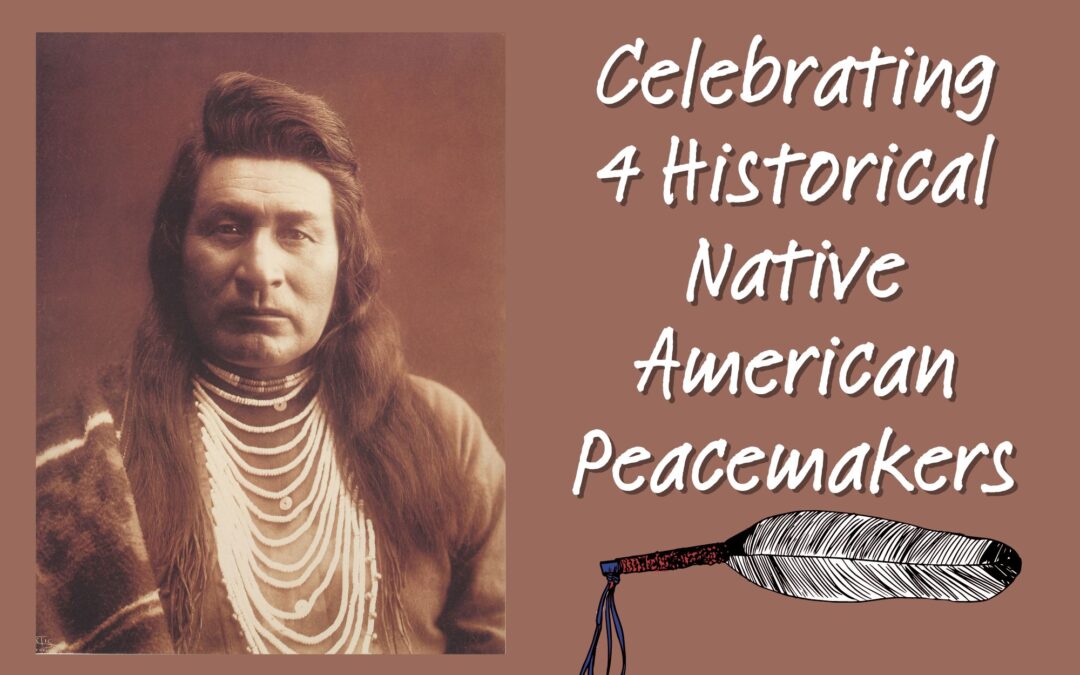In Native American history, there are several outstanding leaders with legacies that still shine brightly not just within their communities, but also in the broader context of peacemaking and justice. This post briefly covers the stories of four remarkable leaders who changed the course of Native American history including:
- White Eyes, a Unami-speaking Delaware
- Deganiwidah, the Peacemaker of the Iroquois
- Standing Bear, also known as Ma-chú-nu-zhe of the Ponca
- Billy Frank Jr., a Nisqually leader
White Eyes
The first story is about White Eyes, also called Captain Pipe. He was a significant figure among the Delaware people and played a crucial role in negotiating peace during the turbulent times of colonial expansion. As a Unami-speaking Delaware, White Eyes worked hard to protect his people’s interests while also trying to find peaceful solutions with the European settlers.
He addressed the Continental Congress in 1776 and worked towards the creation of a separate state to protect the indigenous population. His efforts exemplified the diplomacy and strategic foresight needed to navigate challenging circumstances.
Deganiwidah
Known as the Peacemaker, Deganiwidah is a major figure in Haudenosaunee (Iroquois) history. As the story goes, Deganiwidah brought together the Five Nations of the Haudenosaunee Confederacy—Mohawk, Oneida, Onondaga, Cayuga, and Seneca—under the Great Law of Peace.
He ended fights between tribes and set up a way of governing based on peace, unity, and everyone agreeing. Deganiwidah’s ideas still inspire people who are working for peace and fair treatment around the world. Through the Peacemaker’s efforts and the speeches of his disciple Hiawatha, these two men established the Haudenosaunee Confederacy on the principle of peace.
Standing Bear
Standing Bear, also known as Ma-chú-nu-zhe or Chief Standing Bear, rose to prominence as a leader of the Ponca people in the late 19th century. He is renowned for his advocacy for Native American rights and sovereignty.
In his most famous legal battle, Standing Bear v. Crook (1879), resulted in a landmark court decision affirming that Native Americans are “persons within the law” entitled to rights and protections. The case came about after his arrest for leaving the reservation without permission in order to bury his son in their original homeland of Nebraska.
His courageous stand paved the way for indigenous activism and additional legal victories pursuing human rights and justice.
Billy Frank Jr.
Billy Frank Jr., a prominent Nisqually leader, emerged as a key figure in the struggle for Native American fishing rights in the Pacific Northwest. Beginning in the 1960s, Frank led protests and campaigns to assert indigenous fishing rights guaranteed by treaties signed in the 19th century.
His activism culminated in the landmark Boldt Decision of 1974, which reaffirmed tribal fishing rights and recognized tribes as co-managers of natural resources. Billy Frank Jr.’s legacy as an environmental and indigenous rights champion still inspires others today for Native American rights.
These Native American peacemakers’ stories offer profound insights into the resilience, determination, and strategic vision required to navigate complex historical and contemporary challenges. Their legacies continue to inspire generations of indigenous leaders and advocates committed to peace, justice, and sovereignty.
As we honor their contributions, we also acknowledge the ongoing work towards reconciliation, equity, and mutual respect among all peoples. Men like White Eyes, Deganiwidah, Standing Bear, and Billy Frank Jr. remind us of the importance of cultural preservation and the ongoing struggles faced by indigenous communities.
Reflecting on their accomplishments reminds us of the enduring power of compassion, courage, and collective action that has the power to create a more just and harmonious world for all.

